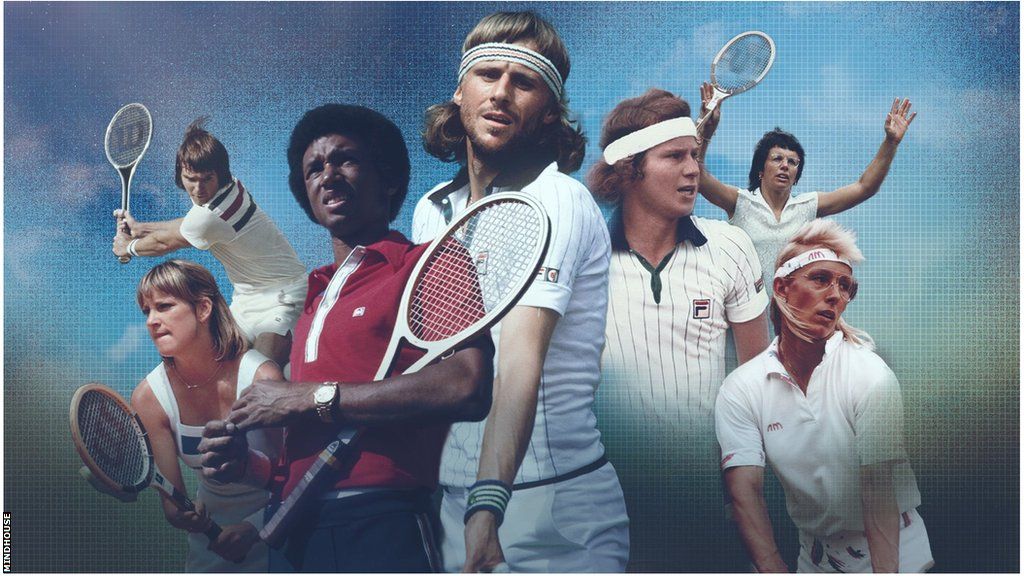Gods of Tennis: How a generation of tennis players changed the world in the 1970s and 1980s
- Published

The new BBC series tells the story of a golden era for tennis
Watch Gods of Tennis on BBC iPlayer. |
A new BBC documentary series - Gods of Tennis - takes viewers back to the 1970s and 1980s to explore how a generation of megastars truly put the sport on the map.
Over the course of two decades, players such as Bjorn Borg, John McEnroe, Billie Jean King, Arthur Ashe, Chris Evert and Martina Navratilova became tennis' first major celebrities.
Tracy Austin, who won the US Open in 1979 aged just 16, remembers Borg being treated by fans as if he were one of the Beatles.
Commercial success followed, and some players used their increased profile to help drive social change.
Austin describes Ashe and King as "incredible champions" but adds what they did off the court was "probably bigger".
Across three hour-long episodes, Gods of Tennis speaks to the players who were there.
Here are just a few takeaways...
Ashe promoted integration in South Africa
Arthur Ashe lobbied the International Lawn Tennis Federation to expel South Africa in 1970
In 1973, Ashe was the first black professional to play in the South African Championships. It came at a time when the country was still under Apartheid rule.
Ashe, who grew up under segregation in Virginia in the United States, made his participation contingent on one stipulation.
"He demanded the tournament had to be integrated," says South African author Mark Mathabane.
For the first time in South African history, Mathabane adds, black people were able to play and spectate at the tournament.
Ashe may have been beaten in the final by fellow American Jimmy Connors, but to Mathabane he was the real winner.
"He made numberless black people in South Africa realise Apartheid is based on a lie," he says.
Already a US Open winner by that stage, Ashe went on to win the Australian Open and Wimbledon.
The 'Battle of the Sexes' turned 'hobbies' into 'careers'
The 'Battle of The Sexes' marked an important step on the road to equal pay
When Billie Jean King won the 1972 US Open, her prize money was $10,000. The men's champion - Ilie Nastase - took home $25,000.
The following year, King formed the Women's Tennis Association (WTA), with a mission to achieve equal pay.
Later in 1973 came an unlikely episode in that campaign - a bizarre, one-off match known as 'The Battle of The Sexes' in which King, 29, took on 55-year-old former men's world number one (and self-proclaimed male chauvinist) Bobby Riggs.
Austin told BBC Sport it "wasn't just a tennis match, it became an event around the world".
In the build-up to the televised match, Riggs made it plain he felt women were inferior to men. King saw him off in straight sets.
Briton Sue Barker, who would later win the French Open, recalls how important it felt. She remembers her coach calling to say: "Your hobby has just become a career."
Later that year, the US Open introduced equal pay for male and female players. The Australian Open began offering equal prize money in 1984, but reversed that decision in 1996, then again in 2001. The French Open and Wimbledon introduced parity in 2007.
'Misunderstood' McEnroe 'knew I was right'
McEnroe was nearly ejected from Wimbledon in 1981 for his outbursts.
The series shows how Borg became tennis' first pin-up in the 1970s.
Towards the end of the decade, though, a perfect foil for the smooth Swede emerged in the form of brash American McEnroe.
The New Yorker became infamous for his on-court outbursts.
"Every time he played a match at Wimbledon, he was basically going against the decorum of the event," says Austin.
In 1981, McEnroe yelled the immortal words "you cannot be serious!" after umpire Edward James called a ball out. It became a catchphrase.
McEnroe admits in the series he felt "misunderstood" at the time.
"I knew I was right," he says. "But they wouldn't say 'look, I missed it, sorry' just once."
Borg won 11 Grand Slam singles titles before retiring at the age of 26. McEnroe retired with seven to his name.
Navratilova cried on court because she felt accepted
The crowd embraced Navratilova at the 1981 US Open final
Chris Evert v Martina Navratilova was an era-defining rivalry for women's tennis.
Navratilova won nine Wimbledon singles titles and 167 singles titles overall on tour - both of which are records.
Despite those achievements, she was "always searching for people to love her and understand her", according to rival Evert.
Navratilova was born in Prague but defected to the United States.
She came out as bisexual in 1981 - months after King was publicly outed - and has since identified as a lesbian.
The emotion of it all came to the fore at the US Open final that year, when the crowd gave Navratilova a standing ovation as she received her runners-up medal.
"I didn't cry because I lost the match," says Navratilova. "I cried because I felt accepted. I always wanted to belong and now I'm a citizen and I'm gay and they're still clapping."
Martina Navratilova talks to Sue Barker about coming out
What's the story of the 'Indian Titanic'? Hear it from the last two known survivors of the SS Tilawa
How to crack those sugar cravings...: Michael Mosley investigates a healthy switch that could boost your mood and memory too